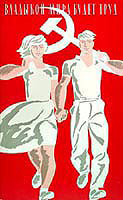Comparative labor and working class history introduces students to a broad range of key issues in the study of working-class history tn. Like other thematic fields in the department, this one emphasizes a transnational approach. Key themes include migration and class formation; gender, racial, ethnic, and class identity; work and other forms of social practice and experience; labor and socialist organizations and politics; labor and authoritarianism; working-class communities and family life; popular culture; unfree labor; and labor geographies. Courses and field readings reflect theoretical approaches and historiography as well as case studies and interpretation. Students in past years have included Latin America, East Asia and Africa in their preparation, as well as the United States, Europe, and Russia.
Other campus resources include the School of Labor and Employment Relations, whose digital library portal includes important studies in labor history as well as the leading journals in the field.
Faculty
Clare H. Crowston (Ph.D., Cornell, 1996)
Professor Crowston specializes in social and cultural history of early modern France, history of women and gender; and the history of work. Her current research focuses on women's work in early modern France and women's guilds, apprenticeship, material culture and the creation of a consumer society.
Daniel A. Gilbert (Ph.D., Yale, 2008):
Professor Gilbert specializes in modern U.S. labor and cultural history. His first book, Expanding the Strike Zone: Baseball in the Age of Free Agency (University of Massachusetts Press, 2013) is a labor history of the transnational baseball industry in the neoliberal era. Current research includes a project on the cultural history of public employee unionism and a study of the place of athletics in the history of U.S. workplaces. Professor Gilbert has a joint appointment in the School of Labor and Employment Relations and the Department of History.
Marc A. Hertzman (Ph.D., Wisconsin, 2008):
Professor Hertzman studies the history of Brazil and Latin America. His first book,MakingSamba:A New History of Race and Music in Brazil(Duke University Press, 2013), treats musicians as workers and places them at the center of the overlapping legal and social structures that evolved in the wake of abolition. He teaches a graduate seminar on Marxism and black politics, the subject of an ongoing research project. Hiscurrent book manuscript, which revolves around the death of Zumbi, the last leader of Brazil’s famed quilombo(runaway slave community), pays special attention to the relationship between African slaves and Asian“Coolies,” and to the ways that twentieth-century Marxists interpreted and appropriated Zumbi’s death.
Erik S. McDuffie (Ph.D., New York University, 2003):
Professor McDuffie specializes in the history of the African diaspora, the U.S. Midwest, black women, black radicalism, sexualities, labor, and black masculinity. Selected publications include Sojourning for Freedom: Black Women, American Communism, and the Making of Black Left Feminism (Duke University Press, 2011); “The Diasporic Journeys of Louise Little: Grassroots Garveyism, the Midwest, and Community Feminism,” Women, Gender, and Families of Color (Fall 2016); “‘A New Day Has Dawned for the UNIA’: Garveyism, the Diasporic Midwest, and West Africa, 1920-80,” Journal of West African History (Spring 2016). Currently, he is working on a new book, tentatively titled Garveyism in the Diasporic Midwest: The American Heartland and Global Black Freedom, 1920-80.
Kathryn J. Oberdeck (Ph.D. Yale,1991):
Professor Oberdeck teaches cultural and intellectual history, histories of class, space, and place, and social theory. Selected publications include The Evangelist and the Impresario: Religion, Entertainment, and Cultural Politics in America,1884-1914 (Baltimore: Johns Hopkins University Press, 1999); "Archives of the Unbuilt Environment: Documents and Discourses of Imagined Space in Twentieth Century Kohler, Wisconsin," in A. Burton, ed. Archive Stories: Evidence, Experience, History (Durham: Duke University Press, 2005); “Of Tubs and Toil: Kohler Workers in an Empire of Hygiene, 1920-2000,” International Review of Social History 55 (2010), and “Competing Geographies of Welfare Capitalism and its Workers: Kohler Village and the Spatial Politics of Planned Company Towns,” Handbook of Employment and Society: Working Space, ed. A. Herod, S. McGrath-Champ and A. Rainnie (Cheltenham, UK and Northampton, MA: Edward Elgar, 2010.) She is currently working on a history of the cultural politics of space in the company town of Kohler, Wisconsin and a comparative project on perspectives on urban blight from below in twentieth- century Durban, South Africa and Chicago, Illinois.